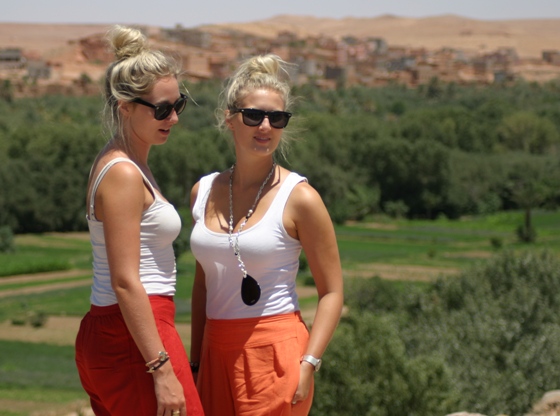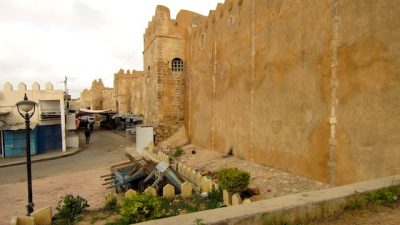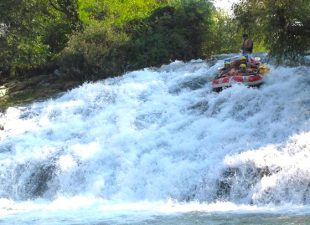 Led by Berber guides, five Australians and I head out on the Chebbi dunes outside Merzouga, Morocco for an unforgettable night under star-filled skies.
Led by Berber guides, five Australians and I head out on the Chebbi dunes outside Merzouga, Morocco for an unforgettable night under star-filled skies.
Yesterday, Merzouga in southern Morocco (a stone’s throw from the border of Algeria) was so hot that I almost passed out in the internet cafe where I worked all day. There’s no air-conditioning here and the fan seemed to only revolve once a minute.
Out on the dunes, the sun is even less forgiving, so our Berber guide, who is leading one of the last few tours that Tucan Travel will conduct in Morocco, postponed our departure until 6pm. After a few fits and giggles (think young girls on smelly, curmudgeonly camels), we and another two small groups made our steady way across some of Morocco’s most impressive sand dunes.
Our small traveling group is great. Joel and Katie from Australia are on their honeymoon, and Katie’s closest cousin Elise is tagging along before embarking on an extended tour of her own.
Ashley and Courtney, two young college students from Australia, have been in the country for nearly a week without their luggage since Royal Air Maroc misplaced their bags. Good sports that they are – it could be an Australian thing – they purchased a few matching “genie” outfits and have maintained good spirits.
Emily, another Australian from Darwin, has just come off a volunteer archaeological dig in Israel’s Adullam Valley (the same area that IEI – backed by Rupert Murdoch and Lord Jacob Rothschild – intend to extract oil shale).And we are led by Abdellah Baba, an exceptional mountain guide who divides his time between England and Morocco. It is he who led last week’s excursion through what I call “Walnut Valley” in the Atlas Mountains, where I learned a little bit about semi-sustainable Berber agriculture. Authentic cultural experience
Authentic cultural experience
While my new friends plodded along on camels, I hiked the 1.5 hours or so to camp, reflecting on how special it is to travel with a guide whose personal experience allows him to provide Tucan’s clients with such an authentic cultural experience.
The young man who packs and leads the camels, Youssef, is twenty years old and speaks a little bit of Spanish, a little bit of English, Arabic, and Berber. In addition to his incredible linguistic skills, he also displayed his drumming talents later in the evening. Unlike many other Moroccans, he never harassed the clients for money, which I attribute to the professionalism of his employer, Omar from the Auberge Aakabar that arranged our trek through the dune’s dry, red waves.
Eco-ness
It also occurred to me that while Tucan promotes sustainable tourism (a market that both Egypt and Morocco are eyeing), the company does not go out of its way to provide a genuine “eco-tour.” Even so, this tour is by nature a sustainable operation – particularly for the locals. Our camp consisted of a few burlap tents, a canvas tent where Lahcen – our chef and host for the evening – cooked up a delicious lentil soup and lamb Tagine, a few European-style toilets (a holding tank buried underground collects the waste), and a makeshift shower.
Our camp consisted of a few burlap tents, a canvas tent where Lahcen – our chef and host for the evening – cooked up a delicious lentil soup and lamb Tagine, a few European-style toilets (a holding tank buried underground collects the waste), and a makeshift shower.
A diesel generator is used (conservatively) to pump water from a well to a tank on a hill, where it is heated by the sun. If not for sensitive bellies, this well could easily provide sufficient water for tourists. My bottle was filled to the brim with it, and so far there have been no unhappy consequences, but tour companies are reluctant to promote drinking local water lest their clients fall ill and demand all their money back. As a result, we used bottled water at camp.
Upping the sustainability factor
My recommendation for a more sustainable experience is to axe the bottles and treat the well water (if necessary, with a placebo maybe?) instead.A tiny solar panel provides light for the kitchen and is supplemented with candles and a medium-sized propane lamp. The sun is so fierce and consistent sun here that in time, if the technology becomes affordable, it is completely feasible to run this entire camp using solar energy.
After dinner, we drank Moroccan wine produced in Volubilis, a former Roman site in Northern Morocco, while our Muslim guides and their helpers treated us with a genuine Berber jam session. We all took a go at the drums, some of us less coordinated than others, and I jokingly requested that our driver Sa’id be our private belly dancer. He didn’t really love the idea. Sharing the love
Sharing the love
Perhaps the most touching part of our trip is that “Baba” knows all of the people he hires very well, and shares a genuine rapport with them. The Berbers are affectionate and playful with one another, and have a great sense of humor. He asked one of the men who helped prepare our meal how many camels he would be willing to give for me. “She’s healthy, blonde, tall, and she has blue eyes,” he said.
“Twenty camels,” was the enthusiastic response!
“Great! It’s a deal,” Baba replied. Apparently I had no say in this matter.
Their camarederie and hospitality was inspiring for the Australians and I. Katie pointed out that in her country, people aren’t as friendly as they used to be, and if they are, there is reason to be suspicious. But here, with a resplendent view of the Milky Way, we find ourselves sharing personal stories, edging a little closer to one another, following the Berber lead.
The night was so special and so real (which to me is often synonymous with sustainable) that a few of us were reluctant to go to sleep. Naturally we did eventually, though the burlap tents were a bit too cozy, so we slept outside instead. We dragged our mattresses up a small incline (causing a few more giggles as we stumbled along the way) and lined them up facing east so that we could watch the sun rise over the dunes this morning. Courtney and Ashley had never slept beneath the stars before, so this was a special treat for them.
As a former tour guide and the oldest person in the group, I was especially proud of the girls for embracing a concept they weren’t 100% comfortable with. Instead of taking a cushy and expensive tour, they opted for a budget adventure that requires them to leave their comfort zone almost every day. Already, in the few days that I’ve known them, I have watched these young ladies blossom.
He is what I love about this kind of trip: the local people benefit from our expenditures, we pack out what we pack in, save a few plastic bottles that are unlikely to be recycled here, so that nature doesn’t suffer from our presence, and our world view expands to include brilliant new colors and experiences. Traveling this way is beneficial and enriching, whereas five star travel, except in unusual cases, often has a negative socio-enviro impact.
On our way back to Merzouga this morning, Baba advised me to walk in the camel’s shadow. It’s cooler there,” he said. That’s an old Berber trick I would not have learned at the Sheraton!
all images via Tafline Laylin
More on eco-tourism in Morocco:
Morocco and Egypt Eye Eco-Tourism Markets
A Side of Sewage with Dinner in Morocco
Rocking the Eco Kasbah du Toubkal in Morocco
To reach Abdellah Baba, feel free to contact him at abdellahbaba [at] gmail dot com.






Nice place i must go there.